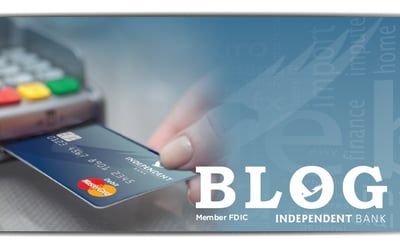EMV Chip Cards
What the transition to chip cards means to your business

Businesses across the U.S. are encouraged to transition to EMV (Euro MasterCard Visa) technology, including an embedded chip in each card to reduce the possibility of fraud.
“While the customer and merchant experience will be changing, this transition to chip cards will benefit both,” says Elizabeth Rose, Assistant Vice President for product development at Independent Bank.
Independent Bank is ready to make this a smooth transition for its business clientele.
Benefits to businesses
Rose estimates, “Forty percent of businesses will be chip-enabled by the October liability shift date. The business conversions are key for the chip card security benefits to be fully realized.” There are benefits to businesses converting to the new chip cards. “It sends a message to the customers that the merchant cares about the security of their information,” Rose says. “Converting takes some fraud liability off the business. If a business does not convert, it will be responsible for certain types of fraud.”
Taking steps toward EMV
Each business is different, so the decision about how and when to make the conversion will depend on a variety of factors.
“For most businesses, cost will likely play a large factor in that decision. The cost will vary depending on the type of systems and equipment the business currently has,” says Rose. “I recommend business owners contact their bank or their merchant service provider to talk about pricing to upgrade their systems and equipment.”
Once a plan is in place for the transition, businesses will need to communicate to their customers about the EMV.
“Let customers know the upgrade is coming and their merchant experience will be changing slightly,” Rose says. “Be sure the staff can assist in processing the transactions. Signage will be helpful, as well. And make sure to promote how secure the chip payment processing is.”
